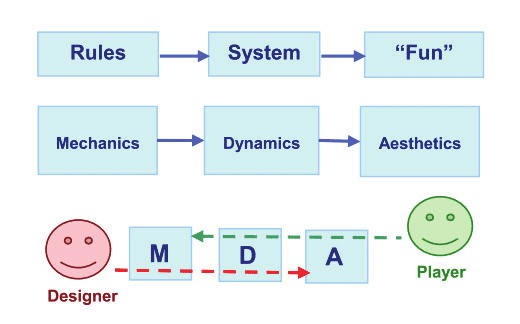 |
| Game MDA - ResearchGate |
What is Game MDA?
Game MDA is a Framework used to understand games in a formal approach. MDA stands for Mechanics, Dynamics and Aesthetics. You can read more about it here.
Mechanics:
Mechanics refer to the rules of the game and how the game functions. They consist of various actions, behaviours and control mechanisms. These mechanics tell the player how the game works and how their action might affect the game. It also determines the player’s outcome at the end of the game.
Examples of mechanics:
- Shooter games include weapons, ammunition and spawn points.
- Card games include shuffling, betting and trick-taking.
- Golf includes balls, clubs, sand traps and water hazards.
Dynamics refer to how the game is played after the mechanics have been applied.
This is how game designers work out the behaviours of players and their approach towards certain rules.
For example, challenge is created by things like time pressure and opponent play. The player must then figure out tactics or strategies to overcome those challenges. Players must also figure out how they can interact with each other.
Aesthetics:
The word “aesthetic” can be misleading as people tend to think if “visuals” when they hear the word “aesthetic”, but in the world of game design, “Aesthetics” refers to the emotional response of the player when he/she interacts with the game system. Or in other words, it’s how fun the game is. If the game dynamics are too difficult then the player feels irritated and if the game dynamics are too simple then the player feels unsatisfied and bored.
Game designers need to find the right balance in order to create a successful game!
When we say a game is “fun”, what do we actually mean by that? The article states that the vocabulary we use is relatively limited and that we should move away from words like “fun” and “gameplay”, instead we should use words like:
- Sensation: Game as sense-pleasure
- Fantasy: Game as make-believe
- Narrative: Game as drama
- Challenge: Game as obstacle course
- Fellowship: Game as social framework
- Discovery: Game as uncharted territory
- Expression: Game as self-discovery
- Submission: Game as pastime
In conclusion, Game MDA plays an important role in the iterative process of game design. This framework helps game designers develop new techniques and figure out what modifications would further improve the game. This in turn will create a better game-play experience for the players!
Here is a video explaining Game MDA if the information was difficult to digest. This video explains it more simply and more in detail.
If you want to learn about Game DDE (Design, Dynamics, Experience) here is the link to that source!
Comments
Post a Comment